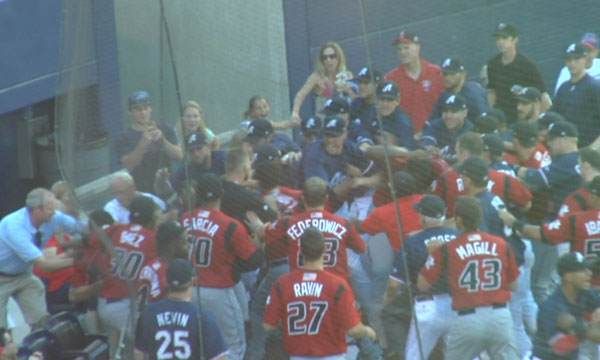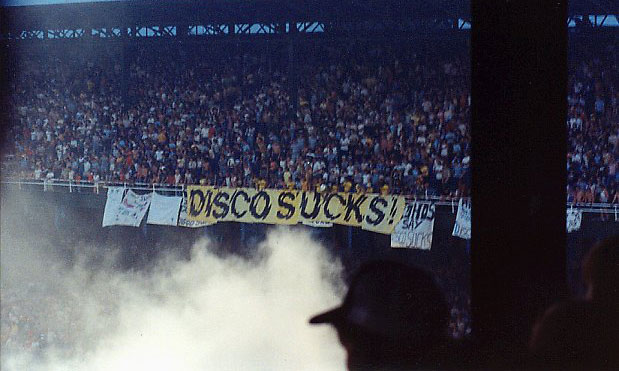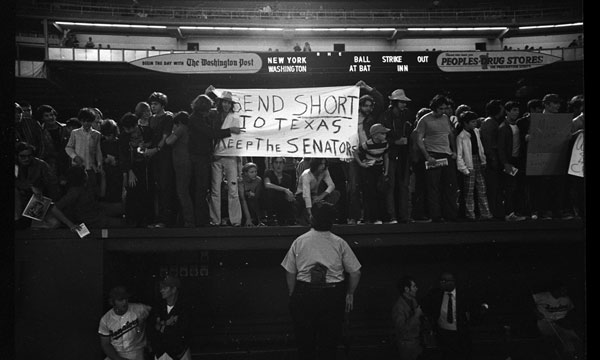Take Me Out To The Riot
From "Disco Sucks" to a jilted city turning on its own team, baseball riots are among the most entertaining you'll find.

"It was just one of those unfortunate incidents that happen in baseball sometimes."
It may seem slow, but baseball is a competitive sport. You have balls being thrown in the general direction of players at least 162 times per game, at minimum—and that's if every single ball is a strike.
And when players get pissed off, the results can be bench-clearing.
Last year, two minor-league teams had a particularly memorable brawl. The Albuquerque Isotopes and Reno Aces, both AAA teams in the Pacific Coast League, last year got into a brawl that cleared both teams' benches.
For nearly a minute, these minor league teams were throwing punches. Ten players got ejected from the game.
"It was just one of those unfortunate incidents that happen in baseball sometimes," explained Aces manager Phil Nevin. "It looked like it was going to be one of those normal things where you come out and guys just stand around a little bit, but whenever you have somebody come fly into the pile and throw punches, things happen. It just escalated from there."
As crazy as that was, though, it was nothing compared to a fight that took place a year earlier between their parent teams, the Los Angeles Dodgers and the Arizona Diamondbacks. After a pitch was thrown at a Zack Greinke's head, things got out of hand, with three solid minutes of fighting between the teams.
It led to ten separate suspensions, and Men's Fitness doesn't even put it in the top ten worst bench-clearing fights of all time.
That's just the players. Just imagine what the fans can do.
"Ty Cobb johnnykilbaned a spectator right on the place where he talks, started the claret, and stopped the flow of profane and vulgar words. Cobb led with a left jab and countered with a right kick to Mr. Spectator's left Welsbach, which made his peeper look as if some one had drawn a curtain over it."
— The New York Times, eloquently describing what Detroit Tigers superstar Ty Cobb did to a fan on May 15, 1912. The fan, pseudonymously referred to as Otto Blotz, got his ass kicked by a legendary jerk. To be fair, Cobb was at the time dealing with a level of fan criticism that the Times described as such: "What they have been saying to the Georgia Peach has no place in a family newspaper or even one that circulates in barber shops only." Why the Gray Lady doesn't write stories with language this colorful anymore, we'll never know.

The night Chicago beat disco to a bloody pulp
Steve Dahl had every right to hate disco. It threatened his livelihood as a disc jockey—he was fired after a format change in 1978—and he had a fanbase to protect.
So when the Chicago-area shock job got hired at a different radio station in 1979, he rode his frustration with disco to its logical conclusion: he took his movement from big ratings to big events, the largest of which was "Disco Demolition Night," a promotion he organized with the Chicago White Sox.
Dahl wasn't alone in hating disco, and the White Sox's Mike Veeck, the team's promotions manager, just happened to be thinking of a similar idea at the time—due in part to the success of a night supporting disco music a couple years prior.
“I was just mesmerized by the fact that we drew 20,000 people," Veeck told Ultimate Classic Rock. "At the end of the night a record plugger named Jeff Schwartz and I were talking about drawing 20,000 to listen to this terrible music. I said, ‘We ought to have a night for people who hate disco, an anti-disco night.’"
Unfortunately for Veeck, the idea worked too well. With Dahl's proto-Stern fanbase in tow, more than 59,000 people showed up to Disco Demolition Night, with another 15,000 in overflow outside. They brought their Gloria Gaynor and Village People records to the venue, ready to see rock music return to its rightful place at the top of the charts.
But when Dahl took the field after the first game of the double-header, explosives and records in tow, Comiskey Park likewise blew up.
“And then all hell broke loose,” Detroit Tigers pitcher Jack Morris told_The New York Times_ in 2009. “They charged the field and started tearing up the pitching rubber and the dirt. They took the bases. They started digging out home plate.”
Because of the stolen bases and bonfires on the field, the second game was ruined—the White Sox had to forfeit—but despite the melee, few people were injured, something Mike Veeck credited to heavy marijuana usage by the fans.
As for disco, it may have faded, but some argue that it never technically died. The Guardian blamed the event on homophobia and racism, though Dahl denies that was the root cause.
(And, for what it's worth, not everyone on the field was there because they hated disco, anyway. Michael Clarke Duncan, the late Oscar-nominated actor, took part in the riots, even though he admitted that he was actually a big disco fan at the time.)
Modern electronic, pop, and hip-hop music have kept disco's bones alive ever since. The "Disco Sucks" movement, however, was just a flash point.
six

Team of jerks leave nation's capital
The early 1970s weren't kind to the District of Columbia.
A couple years prior, Washington had been severely damaged by the riots following the assassination of Martin Luther King, Jr.—riots so bad that some neighborhoods didn't fully recover until the middle of the past decade. Home rule—the ability for the city, rather than Congress, to run its own show—was still a couple of years off, meaning that during an emotionally charged time, cleanup efforts had to go through Congress.
And worst of all, DC was about to lose its baseball team to a bunch of jerks in Texas.
It's no wonder that, considering the context, the last Washington Senators game, taking place on September 30, 1971, ended with the fans having the final say.
The mediocre Senators, who were in the midst of a move to Texas, almost finished their last game with a win. There were two outs in the top of the ninth, and the team was up 7-5 against the Yankees. But the fans, already frustrated by the turn of events, wouldn't have it— they took the field and started making a mess of the place.
"When first base was lifted and carried away, you could tell it was all over," Washington Post scribes Myra McPherson and Tom Huth wrote of the ordeal. "And so, the final irony: the fans lost the game for the Senators, who had to forfeit their last contest here to the Yankees."
It was the second time the District had lost a Washington Senators team in 11 years. The first one had become the Minnesota Twins, and the second, owned by a guy named Bob Short, seemed like it was always destined to leave town.
"I just remember those crazed fans running onto the field, and we ran like crazy," then-New York Yankee Bobby Murcer said of the event in 2006. "First it was a few, then it was thousands pouring out. Nobody warned us this might happen."
But happen it did.
Major League Baseball hasn't had a ton of incidents as insane as Disco Demolition night—definitely not one of that scale in the past 35 years—but the last time a MLB team had to forfeit a game, the fans were to blame then, too.
On August 10, 1995, the Los Angeles Dodgers held a promotion where they gave every fan who entered the stadium a baseball. As it turned out, this promotion backfired when fans started throwing the balls onto the field.
Throughout the game, the field was littered with balls to the point where it was affecting gameplay. And by the 9th inning Dodgers were forced to call it.
"It was unbelievable," then-manager Tommy Lasorda told The Los Angeles Times. "I've never seen anything like this. I'm disappointed in the ones who threw the balls, not the good fans."
Turns out that baseball fans are trolls, even when it's the home team they're trolling.
:format(jpeg)/2018/11/kl9tettufzud5zzdt8vc--1-.gif)
/2018/11/kl9tettufzud5zzdt8vc--1-.gif)

/uploads/ernie_crop.jpg)